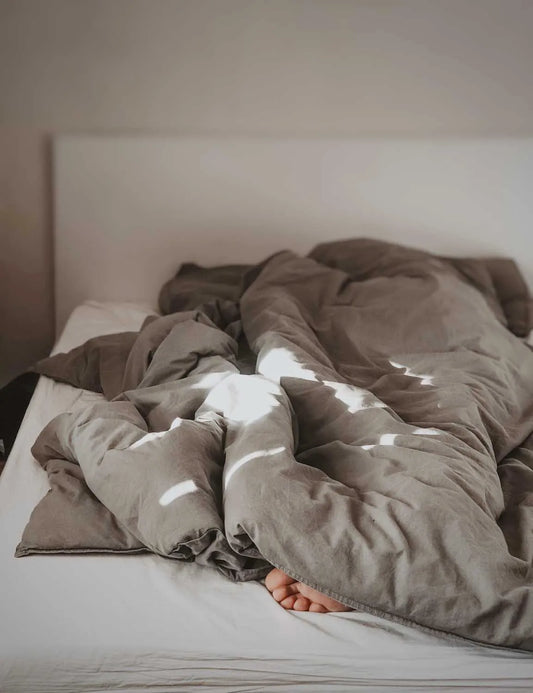| This article is for informational purposes only and is not intended as medical advice. Always consult your healthcare provider for guidance regarding sleep disorders and treatment options. |
Discover the fascinating relationship between sleep and migraines, examining how rest affects headache frequency and intensity. At Remly Sleep, we're passionate about using research to inform our product development, and The Dream Lab is our way of sharing the knowledge we acquire with you.
The Link Between Sleep and Migraines
Migraines are recurrent headache disorders characterized by moderate to severe pain, often accompanied by nausea, vomiting, and sensitivity to light and sound. Research has demonstrated a strong connection between sleep and migraine frequency and severity. This relationship is bidirectional, meaning that sleep disturbances can trigger migraines and migraines can disrupt sleep in return.
How Various Sleep Issues Can Trigger Migraines
Poor sleep can contribute to the development and severity of migraines in several ways:
- Sleep Deprivation and Migraines: Insufficient sleep can be a powerful migraine trigger. When you don't get enough rest, your body undergoes physiological and hormonal changes that can lead to migraines. For example, sleep deprivation can increase the release of inflammatory substances in the body, which can worsen headache pain.
- Sleep Fragmentation and Migraines: Sleep fragmentation, or frequently waking up during the night, can disrupt the natural sleep cycle and contribute to migraines. This disruption can lead to an imbalance in neurotransmitters and hormones, such as serotonin and melatonin, which play essential roles in regulating sleep and pain perception.
- Sleep Apnea and Migraines: Sleep apnea, a sleep disorder characterized by repeated interruptions in breathing during sleep, has been linked to a higher risk of migraines. The frequent awakenings and resulting oxygen deprivation associated with sleep apnea can cause an increase in blood pressure and inflammation, which can trigger migraines.
- Insomnia and Migraines: Insomnia, or difficulty falling or staying asleep, can also contribute to migraine frequency and severity. Prolonged sleep disturbances can lead to an imbalance of neurotransmitters, increased stress, and a heightened sensitivity to pain, all of which can exacerbate migraine symptoms.
- Circadian Rhythm Disruptions and Migraines: Disruptions in your circadian rhythm, or internal body clock, can also play a role in migraine development (Source). Shift work, jet lag, or inconsistent sleep schedules can lead to changes in hormone levels, such as melatonin, which may increase the likelihood of migraine attacks.
How Migraines Can Affect Sleep
Migraines can negatively impact sleep in various ways, such as:
- Difficulty Falling Asleep: The intense pain and discomfort caused by migraines can make it challenging to fall asleep. Sensitivity to light and sound, which often accompanies migraines, can also make it difficult to create a comfortable sleep environment.
- Disrupted Sleep: Migraine pain can cause you to wake up throughout the night, leading to sleep fragmentation. Additionally, migraines can cause other symptoms like nausea or the need to frequently use the bathroom, further disrupting sleep.
- Altered Sleep Patterns: Migraines can alter your sleep patterns by causing you to sleep more during the day to cope with the pain, making it difficult to fall asleep at night. This can lead to irregular sleep schedules and disruptions in your circadian rhythm.
- Increased Risk of Sleep Disorders: People who suffer from migraines are at a higher risk of developing sleep disorders like insomnia or sleep apnea. The relationship between migraines and sleep disorders can be complex, with each condition potentially exacerbating the other.
- Reduced Sleep Quality: Even when you can fall asleep with a migraine, the pain and discomfort can reduce the overall quality of your sleep. This may result in lighter sleep, fewer restorative sleep stages, and a decreased ability to feel refreshed upon waking.
Enhancing Sleep Quality to Manage Migraines
Addressing sleep disturbances and improving sleep quality can help reduce the frequency and severity of migraines. Here are some strategies to consider:
Establish a Consistent Sleep Schedule
Maintaining a regular sleep schedule can help regulate your circadian rhythm, reducing the likelihood of migraines triggered by sleep disruptions. Aim to go to bed and wake up at the same time every day, even on weekends.
Create a Sleep-Friendly Environment
Ensure that your bedroom is conducive to sleep by keeping it cool, dark, and quiet. Use blackout curtains, sleep masks, blue light blocking glasses, earplugs, or white noise machines to minimize disruptions, and invest in a comfortable mattress and pillows to support restorative sleep.
Develop a Relaxing Bedtime Routine
Engaging in calming activities before bedtime can help signal to your body that it's time to sleep. Consider incorporating relaxation techniques, such as deep breathing exercises, progressive muscle relaxation, or meditation, into your nightly routine.
Limit Exposure to Screens and Stimulants
Exposure to blue light from screens can interfere with the production of melatonin, a hormone that regulates sleep. Reduce screen time in the evening and avoid stimulating activities close to bedtime. Additionally, limit your intake of caffeine and alcohol, as these substances can disrupt sleep quality and contribute to migraines.
Seek Professional Help for Sleep Disorders
If you suspect that you have a sleep disorder, such as insomnia or sleep apnea, consult with a healthcare professional for a proper evaluation and treatment. Addressing underlying sleep disorders can improve sleep quality and help manage migraine symptoms more effectively.
Non-Pharmacological Migraine Treatments
In addition to improving sleep quality, there are other evidence-based, non-pharmacological approaches to managing migraines:
- Cognitive-behavioral therapy (CBT): This psychological treatment can help you identify and change maladaptive thoughts and behaviors related to migraines, as well as develop coping strategies for pain management. (Source).
- Biofeedback: By monitoring physiological functions, such as muscle tension and skin temperature, biofeedback can help you learn to control your body's response to stress and pain, reducing migraine frequency and severity.
- Acupuncture: This traditional Chinese medicine practice, which involves inserting thin needles into specific points on the body, has been shown to help reduce migraine frequency and intensity for some individuals.
Consult with a healthcare professional to determine the most appropriate treatment plan for your specific needs.
Conclusion
The relationship between sleep and migraines is complex and bidirectional. By improving sleep quality and addressing underlying sleep disorders, you can potentially reduce the frequency and severity of migraines. Incorporating evidence-based strategies and treatments can help you achieve better sleep and migraine management, enhancing your overall quality of life.
In summary, the connection between sleep and migraines is significant, with both affecting each other in various ways. Improving sleep quality can play a vital role in reducing the frequency and severity of migraines. Establishing a consistent sleep schedule, creating a sleep-friendly environment, developing a relaxing bedtime routine, limiting exposure to screens and stimulants, and seeking professional help for sleep disorders are some strategies to enhance sleep quality. In addition, non-pharmacological migraine treatments, such as cognitive-behavioral therapy, biofeedback, and acupuncture, can also help manage migraines effectively. Consulting with a healthcare professional is essential to determine the most suitable treatment plan for individual needs.
At Remly Sleep, we're committed to helping you achieve better sleep and overall well-being through our innovative products. Stay tuned to The Dream Lab for more insightful articles on sleep health and solutions.




